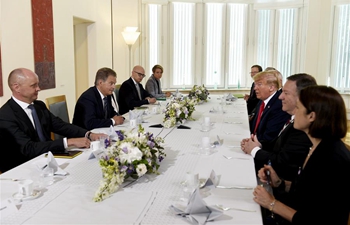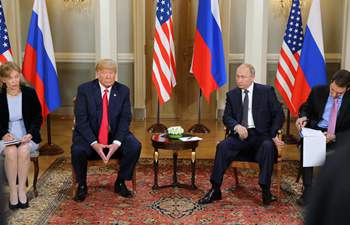by Ali Oktay, Liwei Liu
HOUSTON, July 16 (Xinhua) -- The United States and Iran have gone through a long list of sanctions during their long, tumultuous relationship. President Donald Trump is trying to bring sanctions back on Iran with the aim of reducing its oil exports to zero by November.
Trump announced on May 8 that Washington would walk away from the nuclear agreement, also known as the Joint Comprehensive Plan of Action (JCPOA) signed in 2015, and that he planned to reinstate U.S. nuclear sanctions on Iran and impose "the highest level" of economic sanctions.
Under the JCPOA, Iran will put limits on its nuclear program in exchange for the removal of nuclear-related sanctions imposed on Tehran.
Since Trump pulled Washington out of the nuclear deal, European countries have been scrambling to ensure that Iran gets enough economic benefits to persuade it to stay in the deal. The remaining parties have vowed to stay in the accord, a multilateral agreement jointly negotiated and signed by six international mediators - Russia, the United States, Britain, China, France, and Germany - the European Union and Iran. It was adopted by United Nations Security Council Resolution 2231.
OIL MARKET
The oil market was rattled by the latest sanction threat on Iran, a country producing 3.8 million barrels per day, or 3.9 percent of the world's supply.
Trump urged Saudi Arabia, the biggest producer in the Organization of the Petroleum Exporting Countries (OPEC) and a key U.S. ally in the Middle East, to raise its production to offset a possible decline by Iran.
The main reason behind the request is that the United States does not want to face a supply deficit, which would trigger higher prices and inevitably have a negative impact on the U.S. and global economies.
Michael Maher, senior program advisor at Rice University's Baker Institute for Public Policy, told Xinhua that suddenly cutting off Iranian supplies could be a fairly big shock to the global economy because it tends to raise prices.
"I don't think really high oil prices are in anyone's favor, largely because oil is suddenly facing competition from alternatives," said Maher.
Saudi Arabia has reaffirmed that OPEC would use its spare capacity to offset the loss of the Iranian exports. In June, Saudi Arabia ramped up its production by almost 0.5 million barrels to 10.49 million barrels per day, from its average production of 10.03 million barrels per day in May.
Asian markets take in the lion's share of Iran's oil, including China, India and South Korea. Both India and South Korea reduced oil imports from Iran in June.
GEOPOLITICAL CONSIDERATIONS
The oil market is closely observing developments.
"I think we should be careful of pushing Iran completely to the brink," said Maher, warning that "Sometimes you push people they retaliate even it's not in their best interest in a long term to force you to the negotiating table."
Alan Mohtadi, a senior expert in risk and security from T&S Consulting, in Stockholm, told Xinhua that "what the U.S. and foremost Saudi Arabia is hoping is that the sanctions and isolation against Iran will force Iran to scale down or reduce influence in Syria and Yemen where it has invested massively in the last couple of years. The U.S., Saudi Arabian and Israel are hoping by isolating and sanctioning Iran to curve its influence in the region."
Relations between Saudi Arabia and Iran have been tense with Saudi Arabia blaming Iran for financing Houthi rebels in Yemen that have attacked Saudi assets.
"The Iranian economy is struggling, and we are seeing protests against the Iranian regime in several parts of the country. The sanctions on the Iranian oil sector will come in effect within a couple of months, and it will have a great impact on already struggling Iranian economy," said Mohtadi.
Multinational companies returned to Iran after the signing of the landmark JCPOA agreement. However, many of them left again due to the latest sanctions threat by the U.S. government.
The French oil major Total SA is one of the them, which announced last month that it would not continue its project in Iran unless it gets a waiver from the U.S. government.
Iran relies heavily on oil exports and it exported about 2.4 million barrels a day of crude oil in May. Asian countries are the buyer of two thirds of its oil exports and Europe buys the remaining, according to the International Energy Agency.
Gabriel Collins, Botts fellow in Energy and Environmental Regulatory Affairs at Rice University's Baker Institute for Public Policy, said that "starting the sanction issue will head it into a very different environment than we faced in 2014 and 2015 when we were putting the Iranians to the negotiating table."
He said that the United States then had an extremely high level of cooperation from the European Union and had significant help from India and China.
"We had a very careful campaign of diplomacy where we were engaged with many other parties, and didn't just go and do things unilaterally," said Collins.













